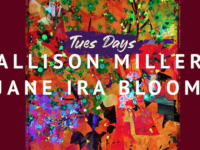Jane Ira Bloom is a most adventurous soprano saxophonist, but sometimes even those musicians who thrive on the edge feel a need to go back to a simpler time when the beauty of a melody was paramount. Bloom makes a retreat from her advanced modern jazz to honor balladry for her upcoming disc, Sixteen Sunsets, due out January 7 on Outline Records.
Did I say “retreat”? Oh no, that implies a step toward surrender and this is hardly that. Sunsets is actually Bloom revisiting a part of her roots, the Great American Songbook, which is arguably built into the DNA of any worthwhile jazz artist.
The point of intrigue of this exercise in particular or any such “standards” excursion in general by such an established artist like Bloom inevitably comes down to how does she put on her own stamp on these classic melodies. How can she perform these old, familiar tunes and keep her personality intact?
For Bloom, this is very easy, because lyricism has always factored in heavily in her playing style. More than any other soprano sax player, her voice finds the most common ground to tenor sax giant Charles Lloyd. And like Lloyd, she can dominate a song simply with tone and cadence. That’s why her ballads album remains very much a Jane Ira Bloom album.
Accordingly, her rhythm section of Dominic Fallacaro (piano), Cameron Brown (bass) and Matt Wilson (drums) assume largely background roles, but as we quickly find at the outset on “For All We Know” the hushed, velvety rhythm section facilitate making these ballads sound like ballads and loom role as the leader becomes sharply defined as a result.
The songs are readily identifiable but aren’t always rigidly straightforward: “I Loves You Porgy” is rendered so gracefully but Bloom and Fallacaro stray some from melody for a spell while still staying well within in its orbit. The backing band discreetly and beautifully manipulates the flow of “Out of This World.” Even within the context of a gentle performance, Bloom finds the opportunities to flex her sax muscles, making the soprano flutter like a bird during “Darn That Dream” but never missing a single note.
Along with nine standards are five-and-a-half homegrown ballads by Bloom; the “half” being the intro “Gershwin’s Skyline” that leads into George Gershwin’s “I Loves you Porgy.” “What She Wanted” is perhaps the best of a fine batch of originals, however. Here, Bloom spins a haunting, gorgeous melody and is singing unknown lyrics through her sax as subtle tempo variations to put a point of emphasis at certain moments. Her “Primary Colors” registers as the only song on this collection that can qualify as an uptempo performance, a jaunty but light Brazilian bounce.
In making a so-called diversion album, Jane Ira Bloom remains very much in character for Sixteen Sunsets. With all the elegance and sound fidelity of an ECM record (Bloom’s saxophone was captured by a battery of microphones that surrounded her) Sixteen Sunsets is the proper way to handle the ballads.
Oh, and did I mention that Sixteen Sunsets has already been nominated for a Grammy, for Best Surround Sound Album?
Visit Jane Ira Bloom’s website for more info.
- Claudio Scolari Project – ‘Bloom’ (2025) - June 12, 2025
- Denny Zeitlin – ‘With a Song In My Heart: Exploring The Music of Richard Rodgers’ (2025) - June 4, 2025
- Ches Smith Quartet – ‘Clone Row’ (2025) - May 30, 2025



